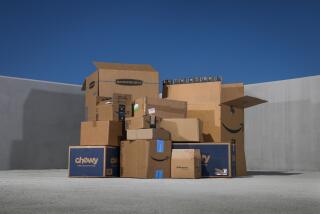Dirty Business : P&G; to Fund Recycling of Paper Diapers
- Share via
WASHINGTON — Procter & Gamble Co. said Tuesday that it plans to fund projects to recycle the plastic from disposable diapers into such things as flower pots, garbage bags and park benches.
The pulp lining of the diapers, once “sanitized,” could be used in cardboard boxes, building insulation and wallboard liner, the company said.
About 85% of babies in the United States wear disposable diapers, adding up to 18 billion discarded diapers each year, which account for as much as 2% of U.S. landfill use. Environmentalists have warned that the plastic-coated diapers don’t decompose once they’re carted to the garbage dump; that, they say, could provide a potential breeding ground for dangerous viruses and bacteria that cause polio, hepatitis, meningitis and other diseases.
“We believe as a company it is our responsibility to ensure that our products are good not only for the baby but that they are good for the environment and can be easily recycled . . . and incinerated,” said Nancy Eddy, P&G;’s project coordinator.
Cincinnati-based P&G;, the largest disposable diaper maker, sells $1.65 billion worth of Pampers and Luvs annually.
Speaking at a news conference at the National Press Club, company officials said P&G; would spend an undetermined amount of money over the next five years on recycling projects in Minnesota, Wisconsin, Washington and Florida.
The project includes an effort with Rabanco Co. and the Solid Waste Utility of Seattle, Wash., which will collect used diapers from 1,000 volunteer households. The diapers will be washed and sanitized before being separated into plastic and pulp.
‘Applaud Efforts’
P&G; will also provide money and soiled diapers to Recomp Inc., a St. Cloud, Minn., recycling company that turns much of that city’s garbage into a composted soil used in landscaping and to reclaim salt-tainted highway strips.
Carl Lehrburger, an Albany, N.Y., recycling expert who has studied disposable diapers for the cloth-diaper industry, questioned whether the recycling of plastic and paper would be economically feasible.
“I applaud their efforts in seeking alternatives to the environmentally harmful disposal of their product,” he said, but added that the company seems determined to maintain its product rather than changing to a more ecologically sound diaper.
In response to the disposal problem, some manufacturers have introduced biodegradable diapers--using a plastic made from corn--that disappear into the environment once discarded.
Lawmakers in Nebraska, a key corn-producing state, have banned the sale of non-biodegradable diapers by 1993. Legislators in Iowa, Washington and Oregon have considered similar action.
But Richard Nicolosi, vice president of P&G;’s paper products division, said the announcement Tuesday was not motivated by market or legislative pressures.
“I don’t think that any one announcement is going to stop the concern within state legislatures,” he said. “What I hope it will do is focus attention on viable solutions.”
P&G; said it will also spend $160,000 on an effort to prove that competitors’ diapers, touted as biodegradable, don’t decompose any faster than P&G; brands.
More to Read
Inside the business of entertainment
The Wide Shot brings you news, analysis and insights on everything from streaming wars to production — and what it all means for the future.
You may occasionally receive promotional content from the Los Angeles Times.










